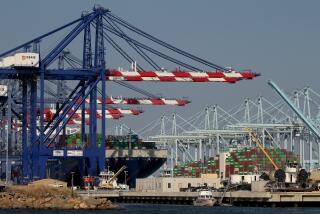Seafarers Union Found Guilty of Coercion
- Share via
A federal administrative law judge ruled Tuesday that one of the nation’s major seafaring unions violated federal labor law by coercing employees of a Redondo Beach oil tanker service into joining the union without an election.
Judge Frederick C. Herzog of the National Labor Relations Board concluded that the Seafarers International Union engaged in unfair labor practices in March when it tried to recruit employees of Gulf Caribe Maritime Inc.
Herzog also ruled that Gulf Caribe improperly retaliated against its workers by cutting their wages and benefits after the employees contacted another union and participated in complaints to the NLRB.
The accusations were brought six months ago by the Inlandboatmen’s Union of the Pacific, a division of the International Longshore and Warehouse Union. It represents about 4,000 seafarers on the West Coast, including 250 in Los Angeles and Long Beach.
The Seafarers International Union--based in Maryland--is a federation of 20 unions with 85,000 members around the world, including merchant sailors, industrial workers and government employees. Its local offices are in Wilmington.
Gulf Caribe, which helps Chevron Oil Co. tankers moor off El Segundo and provides launch services for tanker crews, is owned by Foss Maritime Co. of Seattle, one of the largest providers of tugboat services on the West Coast.
“I have a lot of respect for the employees that stood up to Seafarers International and Gulf Caribe,” said Gerry Millican, an Inlandboatmen regional director who initiated the complaints. “They just wanted to exercise the democratic rights that were denied them.”
Mark Hutcheson, a Seattle lawyer for Gulf Caribe, could not be reached for comment. Hutcheson has said the Seafarers International contract the company used for its Mobile, Ala., operations should have been extended to its Redondo Beach facility.
Attorney Lester Ostrov, who represents Seafarers International, declined to discuss the ruling except to say that he disagreed with many of the judge’s conclusions and will consider appealing the ruling.
Among other things, Herzog said that union officials “engaged in coercive activities by repeatedly telling employees that they had no choice [of unions] and that they would be SIU whether they liked it or not.”
Herzog ordered Gulf Caribe to compensate employees whose wages were rolled back after they turned to the Inlandboatmen’s Union for help and lodged complaints.
If Herzog’s ruling stands after possible appeal, Gulf Caribe employees will be allowed to hold an election to determine which union will represent them or whether they even want a union.
Inlandboatmen officials filed the NLRB complaints against Gulf Caribe and Seafarers International during contract talks for tug crews who worked for Foss in the area. The Inlandboatmen local was concerned that Foss wanted to eliminate its bargaining power and ability to strike amid negotiations.
Millican said the giant tug company might have been able to use Gulf Caribe workers under the Seafarers International contract to replace Inlandboatmen members if they went on strike. Foss representatives contended at the time that they were not trying to neutralize the local union and wanted to maintain a tradition of cooperation.
No job actions occurred. After months of talks, Foss and the Inlandboatmen’s Union finalized a contract in April that moderately increased pay and benefits, but allowed more crew members to live aboard Foss tugs, a condition the union had initially resisted.
More to Read
Sign up for Essential California
The most important California stories and recommendations in your inbox every morning.
You may occasionally receive promotional content from the Los Angeles Times.














